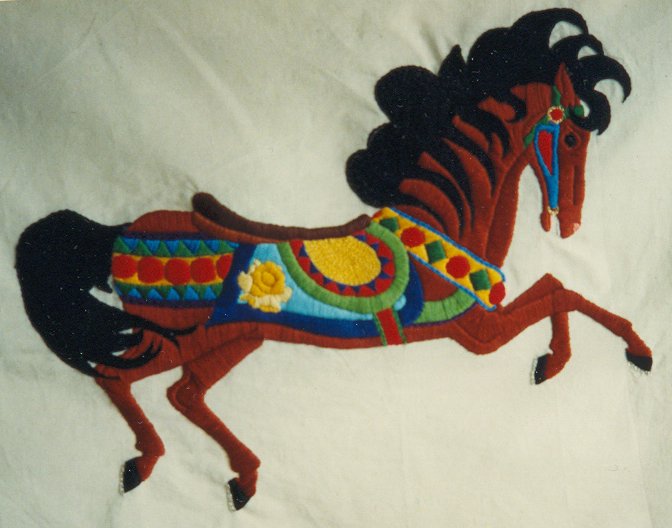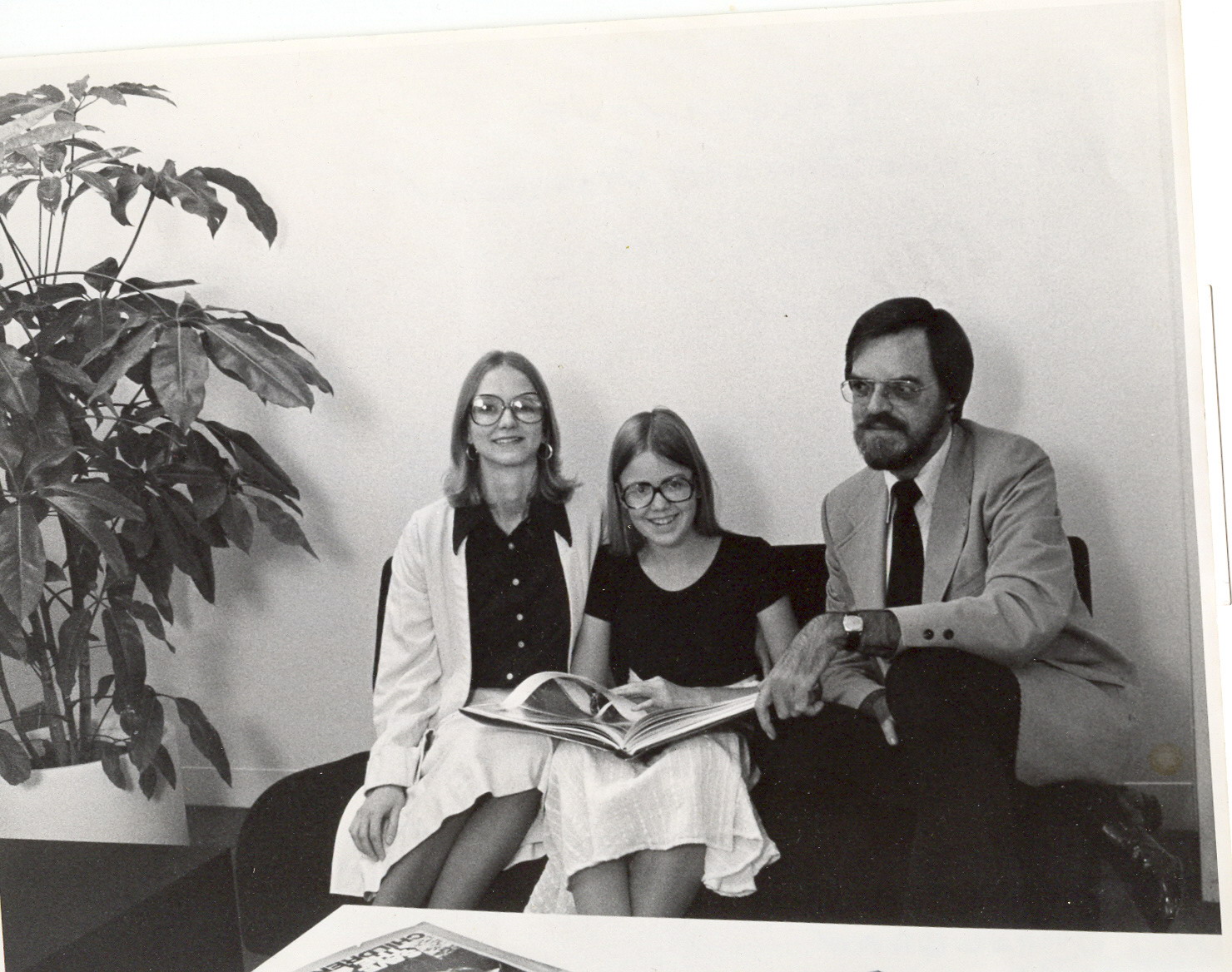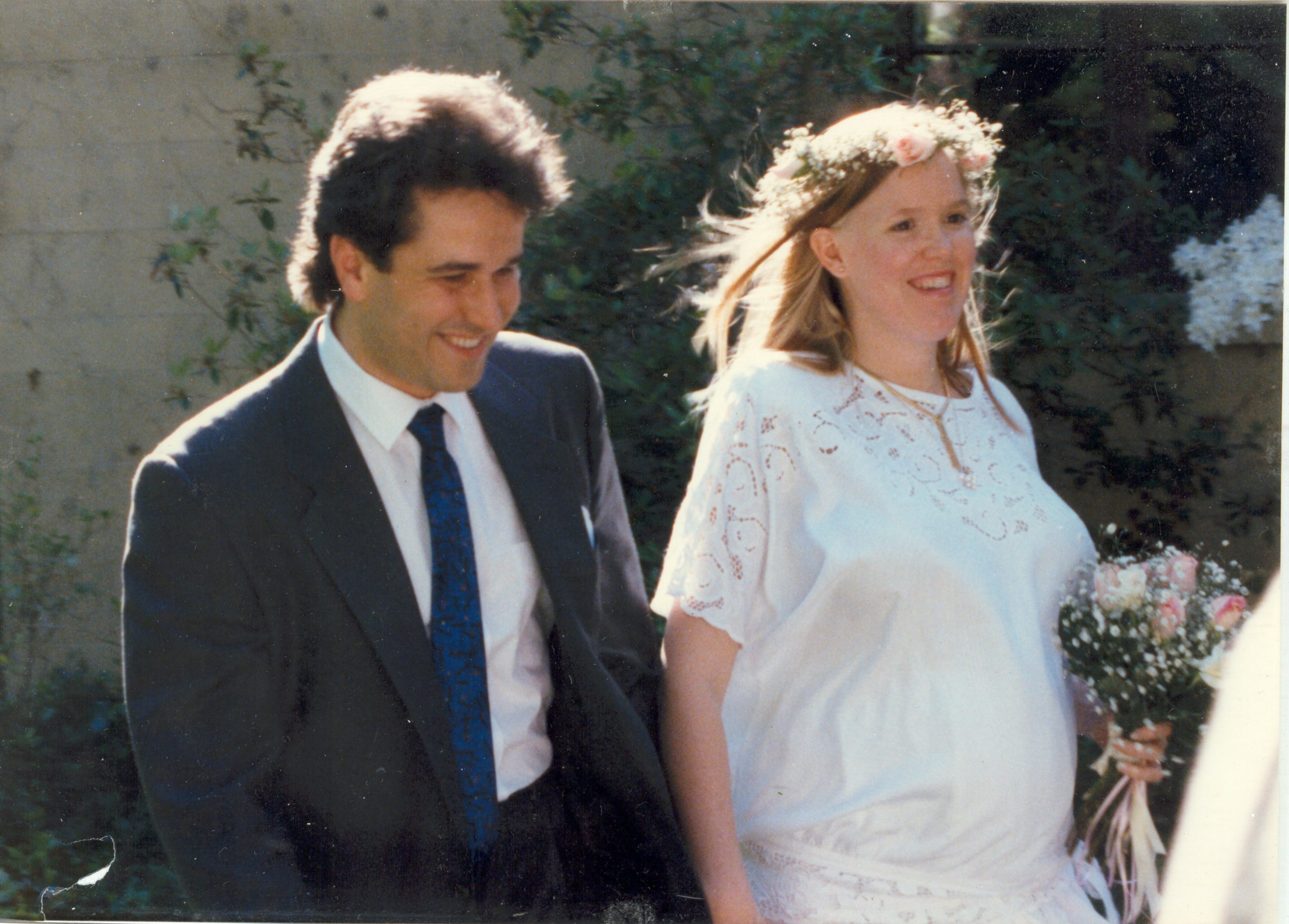May 28th will be the 17th anniversary of the day Enrico and I had our party wedding. We had been legally married – for health insurance purposes – since that January, and I had moved to New Haven and started living with him around March, in an apartment just for us furnished with hand-me-downs from my great aunt and uncle in Washington, and of course Ikea (I still miss that round black dining table).
Having given up my glamorous Washington-based job as an international desktop publishing trainer, I worked temporary secretarial jobs in and around New Haven. One such was several weeks at Southern New England Telephone, where I got my assigned work done so quickly every morning that I had the rest of the day free to make wedding arrangements.
Not that there was much to arrange. Enrico’s parents had given us a cash nest egg, with the stipulation that we not spend it on a fancy wedding – they had married right after WWII, when money was tight for everyone in Italy, and saw the typical modern Italian wedding as a needless extravagance. We agreed with this philosophy, so there was no ground for conflict. In my experience, expensive weddings contribute nothing to the solidity of the marriage.
Seeking a venue, we learned that East Rock Park, the place where we had had a picnic together with our friend Julia the day we first met, had a carriage house which could be rented for $150 for the day. The catch was that it was already booked for Saturday, May 27th, the date I had announced to everybody as our wedding day. We had to fall back on Sunday the 28th, and let everybody know of the change. (As it turned out, Saturday it rained all day, while Sunday was bright and sunny. And the previous wedding party had even left behind some decorations.)
What about food? I called some wedding caterers listed in the Yellow Pages, and was appalled at their prices for food which would have been boring even if made well. We hit on the idea of Indian food, which involved some driving around to Indian restaurants (there weren’t many) and sampling their wares – not that that was unpleasant! In the end we paid $600 for dinner for 50 people, while we provided the warmers, plastic plates, etc. – and the food was great.
After hearing the nosebleed prices, we also decided against a traditional multi-tiered wedding cake. Just around the corner from our apartment was one of the best bakeries in New Haven. I ordered three different cakes (one chocolate, don’t remember the other two) for a total of under $100, each of them sinfully delicious, and each big enough that most people got a taste of all three.
Flowers, too, were ridiculously overpriced. In the end, the only fresh flowers we had were a wreath for my head and a bouquet for me to carry (and throw). For the tables, Enrico’s parents brought confetti from Sulmona. Confetti – candy-coated almonds – are traditional at Italian weddings and christenings, and are included in the bombonieri (the small gifts that the bride and groom give their guests upon departure). There’s some code about how many confetti have to be in each package, and at most weddings the confetti are white, gold, or silver (for christenings, they’re white, blue, or pink).
Sulmona, a small town in Abruzzo, specializes in confetti wrapped in colored cellophane and twisted together to form flowers – from simple daisy-like forms to complex and realistic irises, roses, etc. They’re beautiful and fun, and in our case doubled as table decorations and bombonieri – everyone got to take one home.
To save the trouble and expense of engraved wedding invitations with reply cards and all that jazz, I printed ours on a laser printer at work, mailed them out, and told people to call me. I mailed them to lots of people whom I knew couldn’t attend (including relatives who hadn’t seen me since babyhood, if ever), as an announcement.
Gift list? We didn’t need china and all that (Enrico had a nice set of plates from Conran’s), and didn’t want to accumulate heavy stuff that we would later have to move to Italy. But we were expecting a baby. So I wrote up a short list of items we really needed, from a CD player to a down baby bunting, and gave that to my friend Sue to manage. Everybody who wanted to buy a gift from the list called her to find out what was still unclaimed. Melinda said it was the funniest bridal list she’d ever seen. But it worked – we got the baby stuff we needed.
I waited til the last possible minute to buy a dress to wear, since I was visibly more pregnant by the day. (So much for my dreams of a princess waist sleeveless bodice over a long, full skirt.) At an import store I found an elastic-waisted skirt with a loose tunic top, in white with white embroidery. If I remember correctly, it cost $200 – about as much as I’d ever spent on a dress, but far less than a traditional wedding dress would have cost!
I was planning on only two bridesmaids, and certainly wouldn’t ask them to buy those silly dresses that bridesmaids (including me) so often get stuck with. I asked Sue and Steph to coordinate on the color and, in the end, even that didn’t matter since Steph could’t come.
Friends and relatives began arriving days before the wedding. Julia’s father loaned an apartment he had standing empty in New Haven, with not much in it except mattresses – a bunch of our younger friends slept there. Dad and his (then-fiancee now wife) Ruth stayed in a motel out of town (where, unfortunately, their room was broken into and all the new tall people clothes they had painstakingly bought were stolen). My mother and brother stayed at our apartment with Enrico and me. Altogether about 40 people came from all over the world – Dad and Ruth came farthest (from Indonesia, where they were then working) and danced hardest.
Friday evening we had a “rehearsal” dinner, although there was nothing to rehearse. We were already legally married by a justice of the peace, so we decided not to have anyone officiate at this wedding – we would simply make our vows to each other, before witnesses. I had found a small book of wedding vows at the Yale theological library and adapted something from that – leaving out God and wifely obedience, but leaving in “cleave only unto you.”
The pre-wedding dinner was a noisy affair of family and friends held at a local seafood restaurant. My parents, long divorced, managed to be civil to each other (to my great relief – they had not met in years). Most of my friends and relatives were meeting Enrico for the first time; Mom decided she liked him.
My only disappointment was the lack of two important people: Stephanie, my college roommate, was supposed to be my “other best woman” (along with Sue), but at the last moment had to do some work for her lawyer uncle. Aunt Rosie was kept in Austin by my querulous old grandfather who couldn’t bear the idea of her leaving, even for a few days, no matter the occasion. I never forgave him for that.
Everyone else enjoyed each other’s company (even my rancorously-divorced parents managed to be civil to each other). I don’t remember what we did Saturday, except watch the rain. Sunday morning some friends and I went over to East Rock Park to decorate the carriage house. I put up a quilt I’d been making with scenes from my life, along with pictures of our lives (together and apart) and the people in them, and a sort of family tree attempting to explain why all this motley crew of people were there – family relationships, Woodstock relationships, college relationships… We also hung the flags of India and Texas, but couldn’t lay hands on an Italian one. And we blew up dozens of balloons.
In the afternoon we raced back to our apartment, where Enrico and I (and my belly) squeezed into the shower together (there wasn’t time for two showers), and while we were in there rehearsed our vows one more time. We got dressed (Enrico wearing a suit, something he did so rarely that his Italian friends didn’t recognize him in the wedding pictures), and hopped into our separate cars to drive people to our wedding – which is to say I drove my own limo, a Dodge Colt hatchback (at least it was white). We nearly got sideswiped by a Volvo on the way.
The park management had set up rows of chairs with an aisle down the middle, on the lawn facing the carriage house. We had to ask a guy doing t’ai chi to move so we could process properly, Sue leading, followed by me on my dad’s arm. Enrico’s best man, Giorgio, was wearing a tux – which led to more confusion in the wedding pictures as people who didn’t know either of them assumed that Giorgio was the groom!
We got through our vows quickly (so Enrico wouldn’t faint); there was also a response part from the audience that I don’t remember now how we handled – maybe Sue led that. Then Julia (who was studying opera) sang a song she had had composed for us, with text from the Song of Solomon. I recall it as a beautiful song, but unfortunately we have neither a recording nor sheet music to remember it by.
In most sets of wedding pictures I’ve seen, there’s a moment when the bride and groom exit the church (or wherever) together, with a shared look of joy and relief. We didn’t have anywhere to recess to except around some azalea bushes, but someone managed to get there before us and snap a picture of that magic moment; that’s the photo above.
No one had to drive anywhere to the reception. Enrico took off his jacket and tie to play frisbee. Other people sat around, talked, and waited for food. We eventually had dinner, cake, speeches, public present-opening (and appreciation, especially for the children’s-book style Italian vocabulary), bouquet and garter tossing, and lots of conversation, followed by rowdy dancing into the wee hours (with music from our own stereo system, carried over for the occasion, DJed by whoever felt like it). My brother later said that he hadn’t realized that weddings could be fun! Well, this one was. An auspicious start to a marriage, I thought then – and still do.
1 tanzania surprise | 2 coca-cola & an ostrich | 3 justice of the peace
. Except that the stairs in our house would be impossible.)












